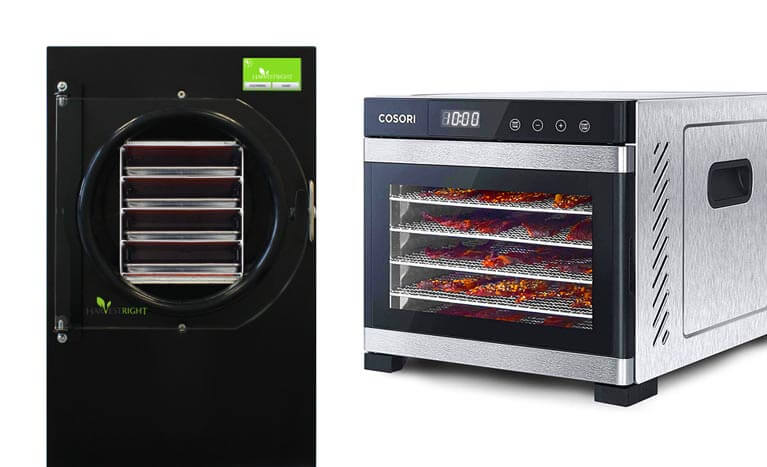I made a gigantic purchase for the homestead: a Harvest Right Freeze Dryer!
If you follow along with my story, you know that creating a proper food storage system and being self-sufficient are incredibly important to me—and they should be to you too! Proper food storage begins with buying groceries from the store or growing produce in your garden; preservation follows.
Instead of buying bulk freeze dried foods pre-packaged at a local Costco, freeze dry and package those same foods yourself! Freeze drying, dehydrating, and canning your own food turns out to be more cost-effective than purchasing from a store. Plus, you sharpen your self-sufficiency skills.
For long-term food storage, moisture must be removed from food. Moisture promotes bacteria, which contaminates the food, rendering it useless. Both methods, freeze drying and dehydration, remove moisture from food.
For the past few months, I've been torn between purchasing a dehydrator or a freeze dryer. Both are wonderful tools to preserve food, but I was leaning more towards a freeze dryer. There's a wide gap in cost between the two—a medium freeze dryer is $2,850 and dehydrators run from $50-$500. With help from my community on my live stream I purchased my first freeze dryer!
The pandemic has increased the demand for food preservation tools. Inflation and supply chain problems have increased prices. In addition, wait times to receive a product have increased. My freeze dryer will take 8 to 10 weeks to arrive, so I'm patiently waiting and preparing for it! If you are interested in food preservation tools, now is the time to get them. Who the heck knows where the world will be a year from now?
Although, I ultimately decided to begin with a freeze dryer, that doesn’t mean that I wont be purchasing a dehydrator if I feel it’s needed on the homestead. This Cosori food dehydrator has incredible reviews and is budget friendly being around $99 at the time I write this.
What is freeze dried food?
Freeze dried food is preserved using a cold vacuum process. Freeze drying is typically a three-step process: first, decide what food to preserve, second, freeze it, and third, place the food in your freeze dryer (a strong vacuum) where ice crystals in the food transform directly into water vapor (instead of transitioning through a liquid state).
What is dehydrated food?
Dehydration has been used for thousands of years. When food is placed on a rack inside an electric dehydrator, hot dry air circulates around the food—removing moisture. The temperature is hot enough to remove moisture but not cook the food resulting in dehydrated food!
What are the differences between freeze dried and dehydrated food?
There are five notable differences:
1) Moisture The cold vacuum process of freeze-drying food removes 98-99% of the moisture. On the other hand, dehydrators only remove 60-70%. The lower the moisture content, the longer the shelf life of the food. This is important when building a long-term layer of food storage.
2) Weight Freeze dried food weighs a lot less than dehydrated food so it's a better option for bug-out bags or camping supplies. I use dehydrated food for day hikes, but for overnight camp-outs and back-packing expeditions I always opt for freeze dried meals. The weight makes a difference!
3) Nutrition The nutrition in freeze dried food remains intact with the exception of vitamin c, which evaporates quickly during the cold vacuum process. The vast majority of vitamins and minerals are believed to remain unchanged from their original state. Dehydrating food is not known to alter iron or fiber, but it can decrease vitamins and minerals like niacin, thiamine, riboflavin, and vitamins A and C.
4) Appearance Freeze dried food generally looks like a smaller version of its original self. On the other hand, dehydrated food appears squished and shriveled. Appearance doesn’t matter though; being able to store the food safely and effectively is far more important.
5) Cost The upfront cost of a freeze dryer is much higher than a dehydrator. Freeze dryers run from $2,000-$5,000 whereas dehydrators can be anywhere from $50-$500. The overall cost of food storage also depends on how much you use the machines.
Taking into consideration the differences outlined above, I chose to invest in a freeze dryer. I love having the option to freeze dry all my leftovers, rehydrate them later, and enjoy the same texture and nutrients I did when I originally ate it! No more purchasing expensive camping meals from a sporting goods store since I can bring my own homemade mac and cheese with me if I bug-out or go backpacking.
The purchase of my Harvest Right Freeze dryer also included these extras:
50-pack Oxygen Absorbers x 1: $19.99
50-pack Mylar Bags x 1: $29.99
Premier Vacuum Pump x 1: $795
Oil Filter x 1: $39.95
Freeze Dryer Trays x 1: $69
12” Impulse Sealer x 1: $129.99
An impulse sealer is an important, but not necessary, tool when sealing mylar bags for long-term food storage. You can use an old straightener to seal the bags, but an impulse sealer simplifies the process.
Home freeze-dried food vs dehydrated food shelf-life comparison
Both methods provide for a long shelf life of stockpiled food, as long as it is preserved and stored properly. Freeze dried food stored in Mylar bags with oxygen absorbers can last 10-30 years, depending on the food, making this a wonderful option for long-term food storage. Dehydrated food properly stored in plastic bags or jars using a vacuum sealer can last up to 10 years, depending on the food.
Food, using either preservation method, will begin to lose its longevity once the bag or jar has been opened exposing the food to oxygen and moisture. Once the container is opened, consume the food before it goes “bad.”
I'm looking forward to using my Harvest Right Freeze Dryer and sharing the experience with you here and on my Gubba Homestead vlog channel!

